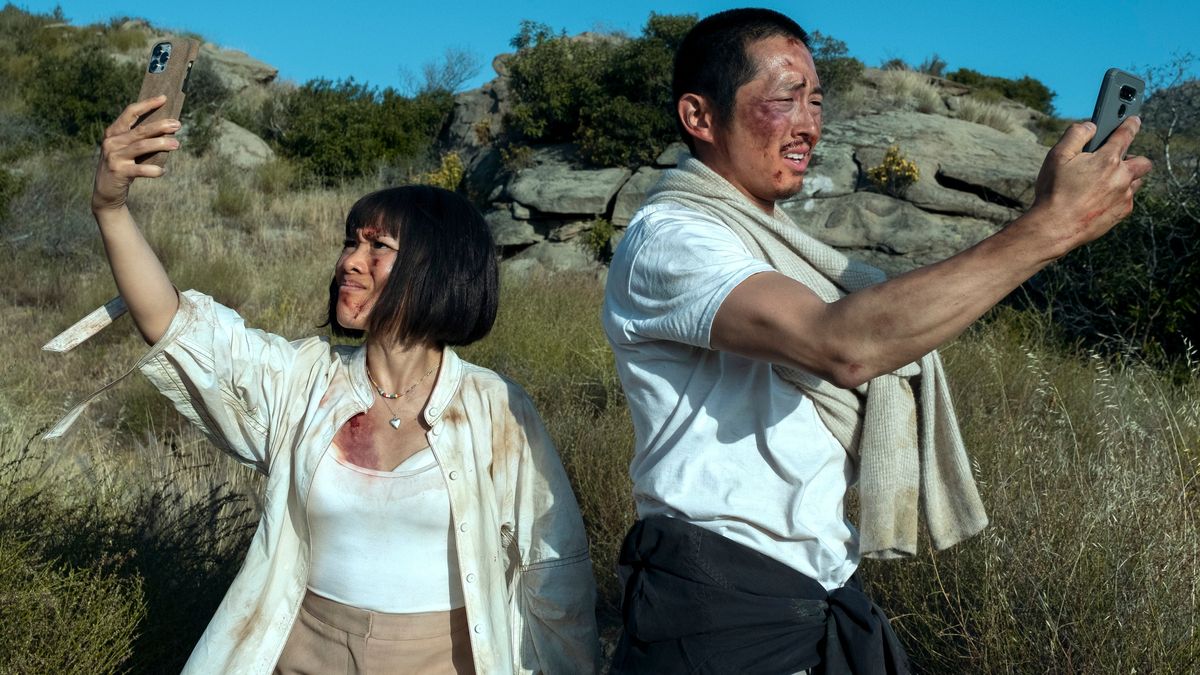Beef: Forgiveness in a Secular World

"Forgive us our trespasses, as we forgive those who trespass against us."
Forgiveness is a central theme in the teachings of Jesus. The Quran encourages believers to forgive: "Let them pardon and overlook. Would you not love for Allah to forgive you?". The Bhagavad Gita elevates Kshama (forgiveness) to a divine quality, while Judaism has an entire day dedicated to forgiveness.
I wonder where the plot for Beef would have landed if Amy and Danny had forgiven each other after their aggravated trespassing. Instead they dig deeper into their guilt driven rage and end up losing their entire lives to their bruised egos. Egos which were pre marinated to be bruised - once you learn about their childhood trauma. Trauma which they never discuss with their significant others - and end up revealing themselves to each other instead - after an accident and then an accidental dose of psychedelic berries.
Let's peel this slowly, starting with
The Masks We Wear
No one lives his life.
Disguised since childhood,
haphazardly assembled
from voices and fears and little pleasures,
We come of age as masks.
Our true face never speaks.
Somewhere there must be storehouses
where all these lives are laid away
like suits of armor or old carriages
or clothes hanging limply on the walls.
Maybe all paths lead there,
to the repository of unlived things.
Rainer Maria Rilke
In an age where we live for the screen - and the digital world is measured in impressions, it is but an obvious by product that we live lives which are not our own. Although the 19th century poet Rilke pointed that out in a poignant poem - making us realize that this condition pre-dates social media. The only difference is we live in a post-theological world. A world where we have replaced religious rituals which lightened the burden of the human condition with a society where virtue signalling has taken precedence over leading a virtuous life. In Beef - when Amy starts telling her husband what happened, he asks her to 'Be Positive'. Wonder what would have happened - if he had let her release her burden.
Which Leads To Repression
As soon as man was capable of conceiving the idea of sin, he had recourse to psychic concealment-or, to put in analytical language, repressions arose. Anything that is concealed is a secret. The maintenance of secrets acts like a psychic poison which alienate their possessor from the community - Modern Man in Search of a Soul, Carl Jung
Amy and Danny both go on to repress their anger from the people around them, something they had been doing all their life. Anger, as I have personally experienced, is repressed sadness. Danny's story arc - after the incident - starts with him trying to kill himself. Amy's story arc starts with her using a gun to arouse herself, or rather shock herself out of her apathy towards everything. Their self sabotaging behaviour is obvious to us, the viewer - but to the people in their lives they seem pretty even keeled till things really start going wrong. No one notices the ripples, till the waves start crashing on your door. In their case when it does - it's too late and they are both stranded in a desert, having lost their loved ones, their internet connection and sanity. They come face to face with each other and and eventually face themselves.
We Are All Seeking Redemption

Amy and Danny are mirror images of each other. It becomes glaringly obvious in the scene when they scream at the same man in the parking lot, although what makes them similar is only revealed to us when they are lying down face to face in the dirt - after having gone through a psychedelic intervention. Amy hates herself and so does Danny. There is nothing deep about that - she even tells her husband 'Yes I am a bad person'. The people around them seem to agree with this - in the end her husband leaves her and takes full custody of the child, while Danny's brother tells him to 'Fuck off' . Why does the show end with Amy hugging Danny as he is recovering from a near fatal injury. Because they finally saw their own self in the other. Otherism is one of the many isms plaguing our current society - where rituals of calling out is fueled by the moral upstanding that the culture wars propagate. We as the viewers are called in to Amy and Danny's world where in the end we can't help but care for them - as we have learnt their stories. Reminds me of the note Mr Rogers always used to keep in his wallet
Frankly, there isn't anyone you couldn't learn to love once you've heard their story.
Amy and Danny's actions hurt people. They are irresponsible, impulsive and outright deadly. Although imagine a world where they didn't have to walk around wearing a mask, repressing their emotions and acting out in the face of desperation. Imagine a world where instead of being called out, you were called in. A world which predicates itself on belonging and not isolating. How would they behave?
Forgiveness begins by understanding each other. Understanding each other takes time. In a society which is always in a rush, and is fueled by judgement algorithms - creating time and space to understand the ones we judge might shake us out of our existential loneliness. At least do it once - like Amy and Danny did.